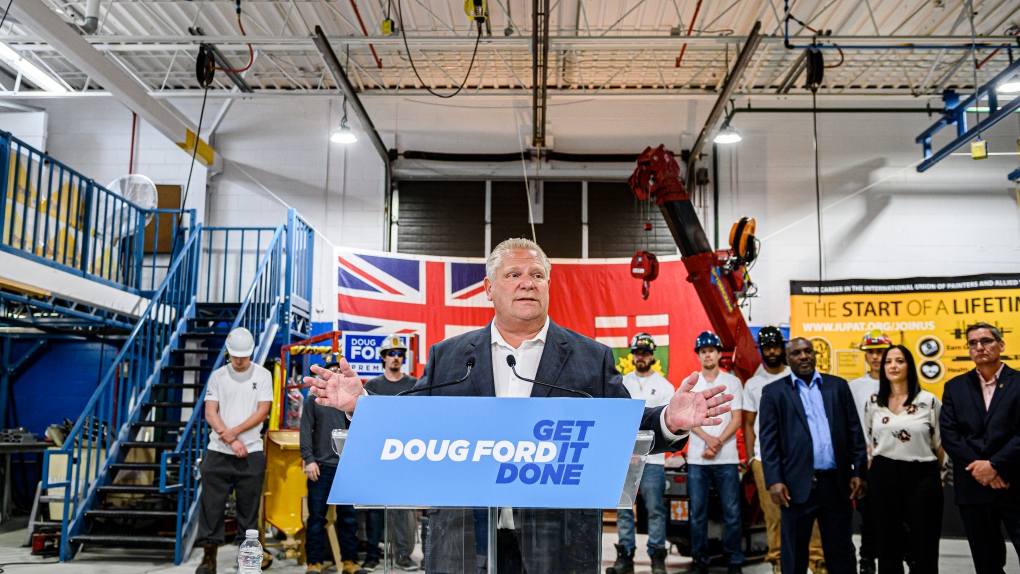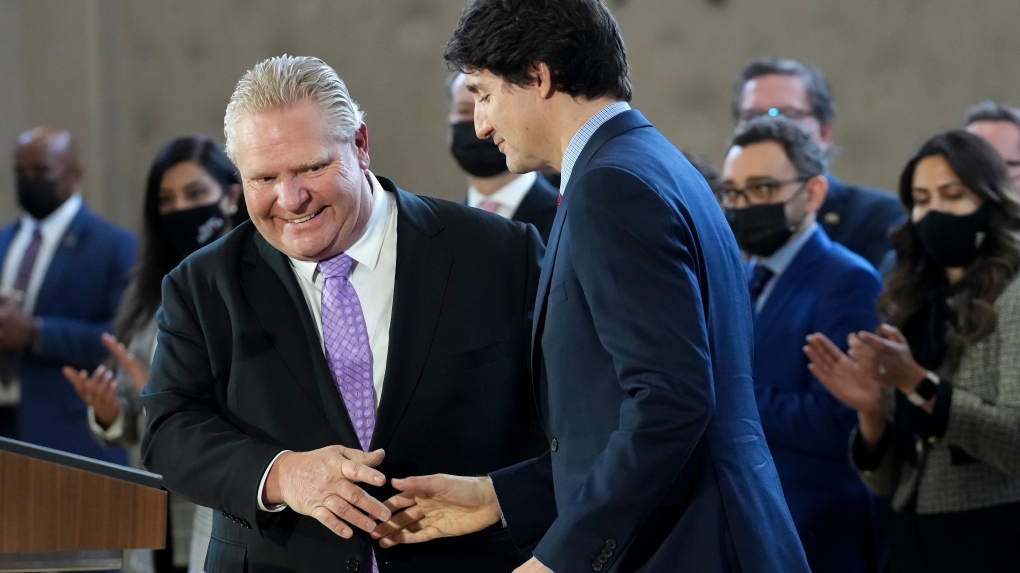Where is Doug Ford? Experts weigh in on why he's shying away from the media this election
Progressive Conservative Leader Doug Ford has limited his media exposure throughout the first two weeks of the provincial election campaign – choosing scrums selectively, restricting public appearances and rejecting media interviews.
Political analysts call this the “front-runner” strategy and say it started long before the writ was drawn.
“It’s been a strategy they’ve implemented for, I want to say, a better part of a year and a half now,” Muhammad Ali, a senior consultant with Crestview Strategy, told CTV News Toronto.
“There was a point when Doug Ford was doing daily press conferences and all of a sudden, he just stopped doing those and they became really spaced out.”
At that point, cabinet ministers like Health Minister Christine Elliott became the go-to “bearers of bad news” when it came to announcing pandemic restrictions. According to Ali, this kept the PC leader from being overexposed and saying things off-the-cuff that may be controversial.
“This is an attempt by his team to control how much exposure he gets and to make sure that it minimizes how much he potentially could rock the boat, because at this point, they're polling so strongly, the only way that they could really collapse, ultimately, is if Doug Ford started saying things that put off voters.”
“And so far it’s working."
Cristine de Clercy, an associate professor in political science at Western University, called this the “front runner strategy.”
“As the premier and someone who has quite a significant level of name recognition among voters and is a front runner, according to the polls, Mr. Ford has much less incentive to seek interaction with the media,” de Clercy told CTV News Toronto.
Already, Ontarians have had four years to get to know Ford, which de Clercy says dilutes the leader’s incentive to open himself up to potential embarrassment, miscommunication or criticism.
“In fact, some strategists argue that if you’re a leader that’s in a so-called front runner position where it seems you’re doing well, and your party is likely to be elected, then actually, you want to minimize contact with the press.”
De Clercy said that’s because interacting with the media is a two-sided coin. On one hand, it’s an opportunity for a leader to get their message and name out to the public, but on the other, there is a risk of facing public criticism.
In essence, there is more upside for first time provincial leaders, like Liberal Leader Steven Del Duca and Green Party Leader Mike Schreiner, to pack their days with media-friendly events.
 Ontario Premier Doug Ford makes an announcement during a campaign stop at the Finishing Trades Institute of Ontario, in North York, Ont., on Tuesday, May 17, 2022. THE CANADIAN PRESS/Christopher Katsarov
Ontario Premier Doug Ford makes an announcement during a campaign stop at the Finishing Trades Institute of Ontario, in North York, Ont., on Tuesday, May 17, 2022. THE CANADIAN PRESS/Christopher Katsarov
This “cost-benefit” analysis, de Clercy explains, means Ford is more willing to engage with the press when he feels he can control the message. Monday night’s debate exemplified this.
Despite disappearing after the first leader’s debate in North Bay, Ford walked out to greet reporters for a scrum after the second election debate in Toronto.
“One way I would interpret that is that he was pleased with his performance, he thought he did well, and he did a good job in presenting his party’s views, and so, he was a little bit more receptive to engaging with the press than if he thought he had done poorly or been treated unfairly in the debate,” she said.
WHAT ABOUT THE OTHER LEADERS?
At Monday’s debate, Del Duca stayed the course with his campaign strategy -- to tell “his story” and help voters get to know him better.
In most of his responses, Del Duca tended to make reference to various family members. His election advertisements read the same way, with his wife, children and dogs making a prominent appearance, and in some cases taking up the majority of the timeslot.
This approach is how some politicians “humanize” themselves, Ali said.
“People, when they see the leader of a party, they think of them as sort of like a robot or something. They don't see them as relatable,” he said.
- Download our app to get local alerts to your device
- Get the latest local updates right to your inbox
In an effort to distinguish himself from the Kathleen Wynne government, whose party lost the majority of their seats in 2018, Del Duca has cast the new roster of liberals as being members of the “new” Ontario Liberal Party, with “some success,” Ali said.
Instead of indulging in familial narratives, NDP Leader Andrea Horwath, who has enjoyed a decade’s worth of public exposure in her current position, took a more combative route at the second debate, directing much of her energy towards criticism.
“The strategy of being very critical and sort of feisty in her exchanges with Mr. Del Duca and Mr. Ford clearly reflected that her party is in many ridings, probably as we speak, locked in a very close race with either the Liberals or the PCs,” de Clercy said.
For the Greens, de Clercy says their platform is crafted strategically to reach certain groups of people who are interested in health care, education and community investment in infrastructure, all while pursuing these goals within a comprehensive environmental framework.
Ali, for his part, said he felt like Schreiner was the real winner of Monday night’s debate.
“He came across as the most articulate communicator,” he said.
AN UNSPOKEN PARTNERSHIP
Right before the writ was drawn, Ford shared a podium with Prime Minister–and Liberal–Justin Trudeau to announce an investment in electric vehicle manufacturing, the last of a series of joint events in the province.
At the time, Del Duca argued that Ford was using this as a campaigning opportunity, a claim both the PC leader and prime minister denied.
Since then, Ford has not said anything about the federal government during his campaign stops, insisting at Monday’s debate that he is a team player who will work with whoever is in power in Ottawa.
“What they had long learned from polling was that Doug Ford polls better when he's doing an announcement with the federal government and he's working in tandem with him,” Ali said. “And so they've intentionally not really made any criticisms, points of contention against the federal government.”
 Prime Minister Justin Trudeau, right, shakes hands with Ontario Premier Doug Ford after reaching and agreement in $10-a-day child-care program deal in Brampton, Ont., on Monday, March 28, 2022. THE CANADIAN PRESS/Nathan Denette
Prime Minister Justin Trudeau, right, shakes hands with Ontario Premier Doug Ford after reaching and agreement in $10-a-day child-care program deal in Brampton, Ont., on Monday, March 28, 2022. THE CANADIAN PRESS/Nathan Denette
Meanwhile, Del Duca has yet to hold an event with the prime minister. Ali warns that Trudeau may be trying to stay out of the provincial election, with the understanding that he will also have to work with whoever is elected premier.
“It doesn't benefit (Trudeau) and he needs to work with Doug Ford to deliver a lot of sort of the bigger platform pieces,” Ali said.
Meanwhile, federal NDP Leader Jagmeet Singh has spent time in the GTA during the campaign period and even attended a rally with Horwath.
CTVNews.ca Top Stories

Father and daughter found dead in northwest Calgary
Calgary police are investigating the death of a father and daughter on Sunday night as a double homicide and believe it's the result of a domestic incident.
Year in review: Notable people who died in 2024
Here is a roll call of some noteworthy figures who died in 2024.
Halifax airport runway reopens after plane caught fire upon landing
The plan that caught fire upon landing at Halifax's airport over the weekend has been removed, and the runway has reopened.
opinion Tom Mulcair: Grading Trudeau's performance in 2024, and what's ahead for him in the new year
Prime Minister Justin Trudeau is about to enter the final year of his mandate and, quite possibly, of his political career, writes Tom Mulcair in his column for CTVNews.ca. The former NDP leader takes a snapshot of Trudeau's leadership balance sheet as a way of understanding how he got to where he is in the polls.
Murder, she spoke: Violence and death getting mentioned more often in movie scripts, study finds
A new study shows that movies have more violence in them than ever -- or at least, movie characters are more interested in talking about it.
Appeals court upholds US$5 million award in sexual abuse verdict against Donald Trump
A federal appeals court on Monday upheld a jury’s finding in a civil case that Donald Trump sexually abused a columnist in an upscale department store dressing room in the mid-1990s.
Gal Gadot reveals she underwent emergency surgery for brain clot just after welcoming her 4th child
Gal Gadot is opening up about how she survived a "massive blood clot" in her brain during her most recent pregnancy.
S&P/TSX composite down more than 200 points, U.S. markets fall
Canada's main stock index was down more than 200 points in late-morning trading Monday, led by weakness in technology and base metals, while U.S. markets also fell, led by a 1.4 per cent loss on the Nasdaq.
Passengers describe travel nightmare after WestJet flight from Costa Rica cancelled
It was a travel nightmare that left more than 100 passengers, including Ottawa residents, stranded in Costa Rica this week.
































